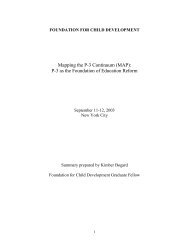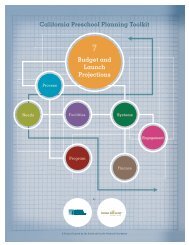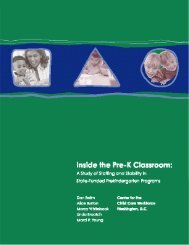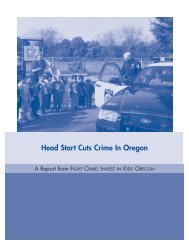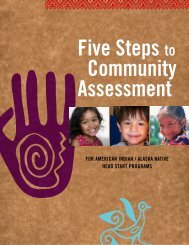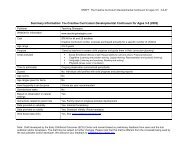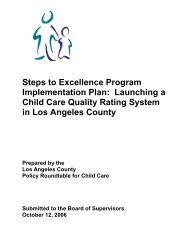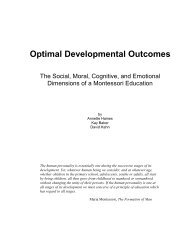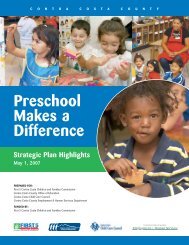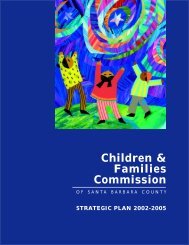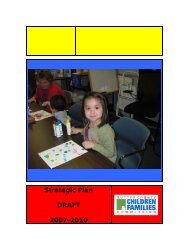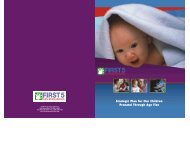Download this file - Plan4Preschool
Download this file - Plan4Preschool
Download this file - Plan4Preschool
Create successful ePaper yourself
Turn your PDF publications into a flip-book with our unique Google optimized e-Paper software.
The Curriculum Commission develops the curriculum frameworks submitted for SBE<br />
approval. EC Section 33538 gives the Curriculum Commission the authority to provide<br />
instructional guidelines: “The (Curriculum) commission shall study problems of courses<br />
of study in the schools of the state and shall, upon request of the State Board of<br />
Education, recommend to the State Board of Education the adoption of minimum<br />
standards for courses of study in preschool, kindergarten, elementary, and secondary<br />
schools.”<br />
The Curriculum Commission makes recommendations to the SBE about the<br />
development of a curriculum framework and appointments to the Curriculum Framework<br />
and Criteria Committee (CFCC). Curriculum frameworks are developed in a public<br />
manner; all Curriculum Commission and CFCC meetings are open to the public and<br />
include the opportunity to comment. The CFCC develops a draft document, and the<br />
Curriculum Commission prepares the draft framework for field review and holds public<br />
hearings on the document. The Curriculum Commission is responsible for the draft<br />
framework that is recommended to the SBE. The SBE also holds a public hearing prior<br />
to considering the framework for adoption. After adoption, the frameworks are available<br />
for purchase through the California Department of Education (CDE) and are available<br />
on the Curriculum Frameworks Web site at http://www.cde.ca.gov/ci/cr/cf/index.asp.<br />
Curriculum frameworks have drawn state and national recognition for focusing directly<br />
on the curriculum and for contributing substantively to the improvement of teaching and<br />
learning. The content standards describe what educators and professionals in the field<br />
expect K-12 students to know. Based on current research in education and the specific<br />
content area, the frameworks provide a firm foundation for curriculum and instruction by<br />
describing the scope and sequence of knowledge and the skills that all students are<br />
expected to master. The frameworks’ overarching dedication is to the balance of factual<br />
knowledge, fundamental skills, and the application of knowledge and skills.<br />
In addition, the frameworks establish criteria to evaluate instructional materials. These<br />
criteria are used to select, through the state adoption process mandated in EC sections<br />
60200—60206, instructional materials for kindergarten through grade eight.<br />
Frameworks also guide district selection of instructional resources for grades nine<br />
through twelve. Although curriculum frameworks cover the K–12 educational program,<br />
their effect can be seen in preschool programs, child care centers, adult education<br />
programs, higher education instruction, and university entrance requirements.<br />
For more information regarding the curriculum frameworks adoption process, contact<br />
the Curriculum Frameworks and Instructional Resources Division, at (916) 319-0881.<br />
Additional information is also available on the Curriculum Frameworks Web site at<br />
http://www.cde.ca.gov/ci/cr/cf/index.asp.<br />
Instructional Materials Evaluation and Adoption Process<br />
The State Board of Education (SBE) has constitutional authority to adopt textbooks for<br />
grades one through eight (Article IX, Section 7.5 of the California Constitution).<br />
California Education Code (EC) sections 60200—60204 describe the process for the<br />
99



